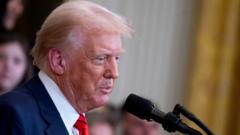In a decisive move, President Donald Trump has signed an executive order that forbids transgender women from competing in female sports at high school and collegiate levels in the United States. This order is positioned as a measure to restore fairness in athletics, with supporting claims from Republicans that it will protect the integrity of women's sports, despite widespread backlash from LGBT advocacy organizations that contend it is a discriminatory policy.
The directive mobilizes the Department of Education to oversee and enforce compliance with Title IX regulations, which address sex discrimination in federally-funded education programs. Administration officials noted that Trump's order reverses the previous Biden administration's stance, which asserted protections for LGBT students without detailed guidance regarding transgender athletes.
Trump's administration plans to collaborate with sports governing bodies like the NCAA to address concerns of female athletes and their families. Moreover, Trump has pledged that measures will be taken to prevent transgender athletes from participating in international competitions held in the U.S., notably targeting the upcoming 2028 Olympic Games in Los Angeles.
Critics of the order, including the Human Rights Campaign, argue that this decision will foster an environment of discrimination and harassment for young transgender individuals. They emphasize the importance of sports as inclusive spaces that promote belonging and assert that policies such as these only serve to alienate vulnerable youth.
As discussions around gender identity and sports continue to evolve, this latest executive order by the Trump administration has reignited the debate over the rights of transgender athletes and their place within competitive sports. With less than 1% of the U.S. population identifying as transgender, the implications and reach of this order are significant, and stakeholders from various sectors are expected to voice their opinions as the situation develops.
The directive mobilizes the Department of Education to oversee and enforce compliance with Title IX regulations, which address sex discrimination in federally-funded education programs. Administration officials noted that Trump's order reverses the previous Biden administration's stance, which asserted protections for LGBT students without detailed guidance regarding transgender athletes.
Trump's administration plans to collaborate with sports governing bodies like the NCAA to address concerns of female athletes and their families. Moreover, Trump has pledged that measures will be taken to prevent transgender athletes from participating in international competitions held in the U.S., notably targeting the upcoming 2028 Olympic Games in Los Angeles.
Critics of the order, including the Human Rights Campaign, argue that this decision will foster an environment of discrimination and harassment for young transgender individuals. They emphasize the importance of sports as inclusive spaces that promote belonging and assert that policies such as these only serve to alienate vulnerable youth.
As discussions around gender identity and sports continue to evolve, this latest executive order by the Trump administration has reignited the debate over the rights of transgender athletes and their place within competitive sports. With less than 1% of the U.S. population identifying as transgender, the implications and reach of this order are significant, and stakeholders from various sectors are expected to voice their opinions as the situation develops.



















